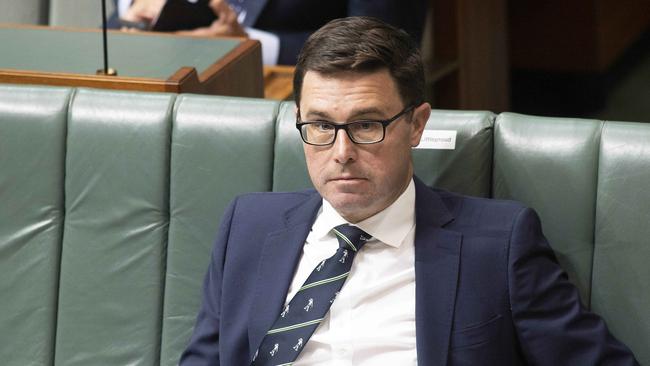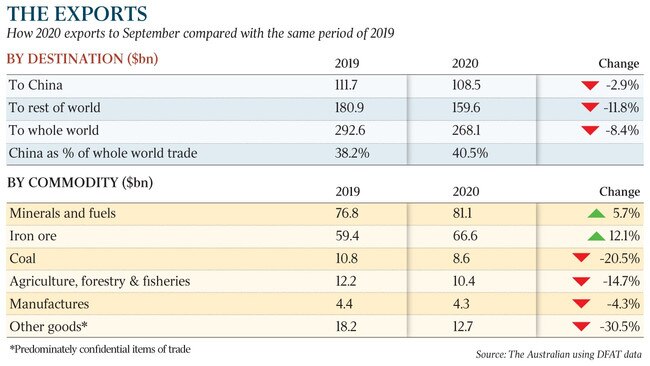Exporters more reliant despite China backlash
Australia’s export sector has become more reliant than ever on China through the COVID-19 crisis despite an increasingly fraught relationship.

Australia’s export sector has become more reliant than ever on China through the COVID-19 crisis despite an increasingly fraught relationship, with aggressive Chinese trade practices having done little to halt the flow of exports to the Asian giant.
Over the year to September, 40.5 per cent of the total value of international goods sales went to China, versus 38.2 per cent over the same period in 2019, based on an analysis of Department of Foreign Affairs and Trade figures.
On a monthly basis, Australia’s reliance on China peaked during the depths of the crisis in May, when it took a massive 46.6 per cent of international merchandise sales in the month.
Comparing the first nine months of this year with the same period last year, total goods exported to China dropped by only 2.9 per cent, against an 11.9 per cent plunge in the value of goods exported to the rest of the world.

A 12 per cent jump in iron ore, to $66.6bn in export sales over the nine months to September from $59.4bn over the same period in 2019 was primarily responsible.
Scott Morrison offended China’s ruling Communist Party this year by supporting an inquiry into the origins of the pandemic. Since then, Australian exporters of beef, barley, lobsters, wheat, thermal coal and wine have felt the weight of increased tariffs, quotas or outright bans.
Adding to this expanding list, reports emerged on Thursday that China had blocked Victorian timber due to the presence of a pest known as bark beetle.
Wood exports to China were worth $1.5bn in 2019 — making China Australia’s biggest international market, but representing just 1 per cent of the $148.4bn in total sales to that country, according to DFAT data.
With the chilled China-Australia relationship showing no immediate signs of thawing, the spectre of further trade action looms. Experts say major commodity exports such as iron ore and LNG will not fall prey to politically motivated imposts.
CBA commodity analyst Vivek Dhar said China’s steel sector was too dependent on Australian iron ore for Beijing to force it to find another source of supply.
Queensland’s three LNG export projects have seen significant investment by China’s state-run energy giants, such as CNOOC, Sinopec and PetroChina, he said. Last year, Australian exporters accounted for 62 per cent of Chinese iron ore imports, and half of the LNG China bought from abroad, according to ANZ data.
However, Chinese demand for Australian thermal and metallurgical coal has been crimped by an aggressive official quota that requires a 10 per cent fall in overall coal imports this year versus the last, and predates trade tensions.
Coal exports to China so far in 2020 are $8.6bn, down by a fifth against the $10.8bn sold by this time last year.
Coal prices fell sharply in October and have stayed low since reports that China state-owned utilities and steel mills were told not to buy thermal and coking coal from Australia.
On Thursday, Education Minister Dan Tehan described reports that China had placed restrictions on timber out of the Victorian port of Portland as “deeply troubling”, but noted “Chinese authorities had denied the rumours and we welcome these statements”.
Agriculture Minister David Littleproud, speaking on 2GB on Thursday, indicated the latest friction in timber exports was related to the trade stoush.




To join the conversation, please log in. Don't have an account? Register
Join the conversation, you are commenting as Logout